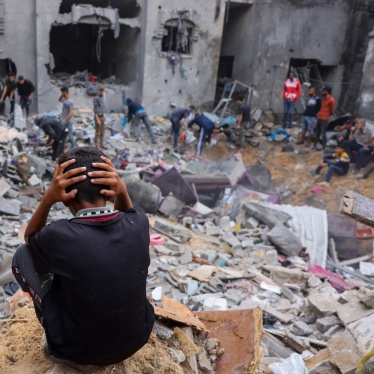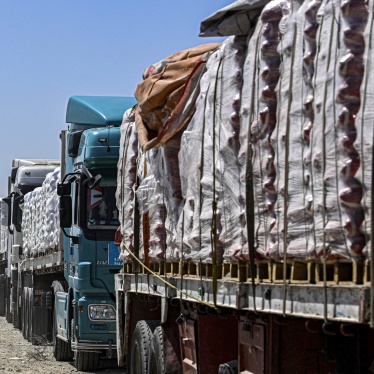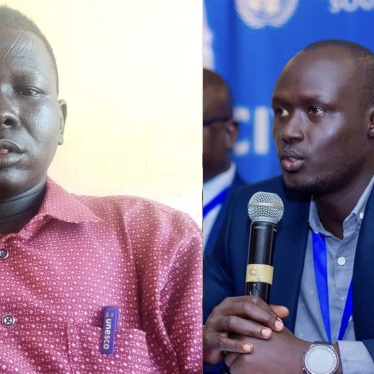Human Rights Watch offers its comments on the pending U.N. Security Council resolution regarding the establishment of a new Interim Government for Iraq and the rights and responsibilities of this new government and the multinational force in Iraq.
Human Rights Watch applauds the efforts of the Security Council to work towards establishing a democratic and independent government for the people of Iraq. However, we believe it is essential that any Security Council resolution clearly delineate and reaffirm the ongoing responsibilities of the United States and Britain, as leaders of the multinational force in Iraq, under the Geneva Conventions to the extent they continue to exercise effective control over Iraq’s security. The Security Council resolution also should provide greater clarity and guidance with regard to the administration of justice under the new Interim Government, including the administration of detention centers and prisons, the treatment of detainees, and the general protection of human rights in Iraq.
Continued Obligations of United States and Britain under the Geneva Conventions
To the extent that the multinational force headed by the United States and Britain continues to exercise ultimate authority in matters relating to Iraqi security, it will remain responsible under international law for ensuring security and human rights in Iraq. The draft resolution should make this clear. A declaration that the Iraqi interim government is “sovereign” is insufficient to absolve those exercising de facto power of their responsibilities under the Geneva Conventions
The draft resolution makes reference to the “fully sovereign” Interim Government’s assumption of “responsibility and authority … for governing Iraq” and appears to predicate the ongoing presence of the multinational force in Iraq on a preordained “request of the incoming Interim Government of Iraq.” The draft resolution further makes allusion to “arrangements… to establish a partnership between the multinational force and the sovereign Interim Government” and references “close coordination” between the force and the government.
Notwithstanding these declarations of the Interim Government’s sovereignty, the fact remains that the U.S.-led multinational force will continue to assert de facto military control over Iraq. The draft resolution “decides that the multinational force shall have authority to take all necessary measures to contribute to the maintenance of security and stability in Iraq including by preventing and deterring terrorism,” providing explicit legal authority for the multinational force’s continued exercise of significant military authority and broad discretion for its operations in Iraq.
While stipulating the limited authority of the Interim Government and the final authority of the United States and Britain in matters of military control, the draft resolution nonetheless asserts in paragraph 2 that “the occupation will end” on June 30, 2004. The draft resolution should instead reflect the continued reality of occupation under international law. This is an issue not of political semantics but of legal responsibility. The Security Council should ensure that the desire to make progress on the political front does not obscure the important responsibilities that the legal occupiers continue to bear. As a result of their continued exercise of effective control in Iraq, the United States and Britain will continue, as a matter of law, to bear the essential duties of occupying powers under the Geneva Conventions. Regardless of duties that have been delegated to the Interim Government, the draft resolution should reaffirm the responsibilities of the multinational force to ensure public order and safety, protect human rights, preserve property, and ensure access to basic services, including water, food and electricity, so long as their control of Iraq continues.
In this regard, it should be noted that notwithstanding the grant of control of the Iraqi police, border enforcement, and Facilities Protection Service to ministries of the Interim Government, the United States and Britain will continue to be ultimately responsible for ensuring public order and safety in Iraq. Similarly, notwithstanding the transfer of the “rights, responsibilities and obligations relating to the “Oil for Food Program” to the Interim Government, the draft resolution should make explicit the obligations of the United States and Britain to assure the Iraqi population’s access to food and water.
Justice and Accountability
Human Rights Watch is concerned that the draft resolution is entirely silent on the need for justice and accountability for ongoing serious human rights violations in Iraq and provides no guidance whatsoever on the capacity of the Interim Government to prosecute crimes of universal jurisdiction -- torture, war crimes, or crimes against humanity -- committed against its citizens.
Specifically, it remains unclear whether the Interim Government will have the authority to prosecute such crimes and violations of law by members of the multinational force or contractors hired by its component members. In light of the recent revelations of abuses of Iraqi detainees at the hands of multinational forces, the Security Council should explicitly grant the Interim Government the authority to establish a judicial mechanism to investigate and prosecute such crimes against its citizens.
It will also be important for the draft resolution to stipulate that the Security Council will monitor the conduct of any status of forces agreement that is negotiated between the United States, as representative of the multinational force, and the Interim Government to ensure that such negotiations are conducted on a true arms-length basis and are fair and balanced. Given the American administration’s unwillingness to disown all forms of coercive interrogation, the Council should be especially wary of any blanket immunity or grant of impunity for the multinational force or its agents. The lack of an investigative and prosecutorial power that is independent of the United States would be particularly troubling in this regard.
Legal Status of Detainees and Control Over Detention Centers
The draft resolution makes no mention of whether the Interim Government will have authority over the prisons and detention centers in Iraq, particularly those housing detainees arrested by the multinational force. Further the draft resolution is entirely silent on the status of the remaining detainees in Iraq and whether they will remain under the control and jurisdiction of the Interim Government or the multinational force.
The United States and the United Kingdom have failed to operate the detention centers in a manner that complies with basic principles of human rights, including freedom from arbitrary arrest and detention, torture, and cruel, inhuman or degrading treatment. The United States in particular has continued to assert its right to conduct interrogations employing certain techniques that are prohibited under the Geneva Conventions and the Convention against Torture. The policies and practices of the multinational force have caused not only great harm to the detainees who have directly suffered at the hands of the torturers, but now also contributed to the overall climate of fear and lawlessness that currently prevails in Iraq. For this reason, the Security Council should specify the need for conditions of detention and interrogation to comply with the Geneva Convention and the Convention against Torture.
Furthermore, the Security Council should require that detention centers be operated in a transparent manner, and be open to investigation, monitoring and review by international as well as Iraqi human rights organizations. Such organizations should be allowed access to the detention centers and granted the opportunity to interview detainees about their detention conditions.
Finally, the Security Council resolution should require the multinational force to provide all information it has regarding the number and status of detainees who have been in its custody, to date; the number of detention centers and their location throughout Iraq; and any facts and findings regarding the mistreatment of detainees.
Protection of Human Rights
Human Rights Watch is concerned that the draft resolution makes only vague and incomplete references to the protection and promotion of human rights in Iraq, with no specific instruction as to the Interim Government’s or the multinational force’s duties with respect to human rights.
The draft resolution provides only an extremely vague human rights mandate for the Special Representative of the Secretary General and the United Nations Assistance Mission for Iraq. It calls for them, “as requested by the Interim Government,” inter alia, to “promote the protection of human rights.” “Promoting human rights” is often interpreted narrowly to encompass only or mainly the field of human rights education and public awareness campaigns. We urge you to strengthen this mandate by specifically including human rights monitoring and protection activities.
Recent events in Iraq have underscored the need for such a mandate. Human rights monitors should report regularly to the Security Council with authoritative information and analysis on the human rights situation in the country and make recommendations for remedial action, including long-term institutional reform. The monitors’ work would also help to bolster the confidence of the Iraqi public that progress is being made towards human rights improvements. Monitoring missions of this kind have played an important and constructive role in other post-conflict transitions in which the Security Council has been involved, for instance in Cambodia, East Timor, Bosnia-Herzegovina and Kosovo. The United Nations Office of the High Commissioner for Human Rights should be given the necessary mandate and resources for this task.
Human Rights Watch further notes with concern the absence of any reference to Security Council resolution 1456 (2003) in its draft resolution paragraph 15 reaffirming the obligation of Member States with respect to “terrorist activities in Iraq or against its citizens.” This draft resolution should reiterate the requirement of Resolution 1456 that States “must ensure that any measure taken to combat terrorism comply with all obligations under international law, and should adopt such measures in accordance with international law, in particular international human rights, refugee and humanitarian law.” Particularly in light of recent revelations about the mistreatment of detainees by the multinational force in Iraq, as well as questions about excessive force in recent incidents of conflict with various armed groups, it is especially important that the Security Council reiterate the legal obligations of the Interim Government and Member States, in connection with counter-terrorism campaigns or otherwise, to abide by international law. The draft resolution should explicitly require in its operational paragraphs that the multinational force abide by international law, including international humanitarian law.
The Security Council carries an important responsibility for the protection of the human rights of the Iraqi people in the course of this political transition in Iraq. Over the past few years, the Security Council has made important commitments to the protection of human rights in post-conflict transitions and has sought to implement these commitments through its interventions with respect to individual countries. It is essential that these human rights and humanitarian concerns remain at the forefront of the Council’s response to the reconstruction of Iraq.
We look forward to continued dialogue with you on these important issues.
Respectfully yours,
Kenneth Roth
Executive Director
Sarah Leah Whitson
Executive Director
Middle East and North Africa Division
cc: Secretary-General Kofi Annan







